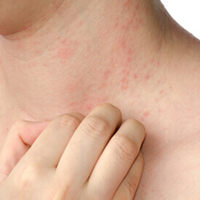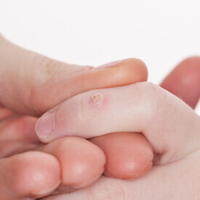About Psoriasis
Dr. Catherine Papasakelariou of Houston Premier Dermatology in Houston, TX helps men and women with the treatment and ongoing maintenance of psoriasis. Psoriasis a persistent skin condition, and it occurs when your skin cells grow too quickly. Psoriasis causes red, flaky, light-colored patches of skin that become itchy, inflamed, scaly, and can scab. During normal skin cell cycles, cells flake off about every four weeks (once a month). People who suffer from psoriasis have skin cells that build up too quickly and form what are called plaques. The plaques can vary in size and position on the body, forming around the elbows, hands, knees, scalp, and lower spine.
Psoriasis has several different types, and it ranges in different levels of severity. Referred to as plaque psoriasis, this is the most commonly experienced and is generally easy to treat. However, some patients may suffer from severe cases that require several treatments throughout their life. Additionally, it's important to note that psoriasis is not contagious. When psoriasis is diagnosed, Dr. Papasakelariou can help patients manage their symptoms to decrease flare-ups.
Reviews
Psoriasis Causes
Unfortunately, doctors have not discovered the fundamental cause of psoriasis. Overall, doctors think that the immune system overreacts, which causes inflammation, as well as the flaking of your skin. Also, psoriasis is likely a genetic disposition. Approximately 1/3 of those who have psoriasis have one or more family members with this skin condition. Scientists believe that specific genes interact with each other, which contributes to psoriasis. However, you must inherit the ideal combination of genes and then experience a specific trigger. Symptoms may appear following a known trigger, like a stressful occasion, certain medications, dry weather, or even a bad sunburn.
Psoriasis Symptoms
Common symptoms associated with psoriasis include raised, bright, red patches of skin that have loose and silvery scales. Plaques may also pop up in the same location on each side of your body, such as on both knees and/or both elbows. The top of your scalp may experience anything from mild scaling to regions of thick, crusted plaques. Itching commonly occurs before flare-ups, particularly when psoriatic patches appear in body folds under the buttocks or breasts. When patients pick or scrape off scales, tiny regions of skin irritation may happen. This is known as Auspitz's sign.
Treatment Options
While there is no cure for psoriasis, you'll find a variety of treatment options available to manage the condition based on the severity and type of psoriasis. For mild cases, doctors can reduce the symptoms with prescription lotions, creams, and ointments. If your head is affected, Dr. Papasakelariou may suggest using specific oils, shampoos, and sprays. She may also prescribe oral or injectable systemic medications that work throughout the body. Usually, systemic medications help patients who have moderate to severe psoriasis and psoriatic arthritis. Also, advances in laser therapy have provided tremendous outcomes for many psoriasis cases. Employing phototherapy exposes a patient's skin to a specialized ultraviolet light that helps minimize symptoms.

Improve your psoriasis
For many patients, psoriasis is painful and embarrassing, making it difficult to carry out simple tasks in your everyday life. If this is your situation, we encourage you to reach out to Houston Premier Dermatology in Houston, TX at your earliest convenience. During an appointment with Dr. Papasakelariou, she will evaluate your skin and develop a personalized treatment plan to help make your symptoms tolerable and your quality of life better.













